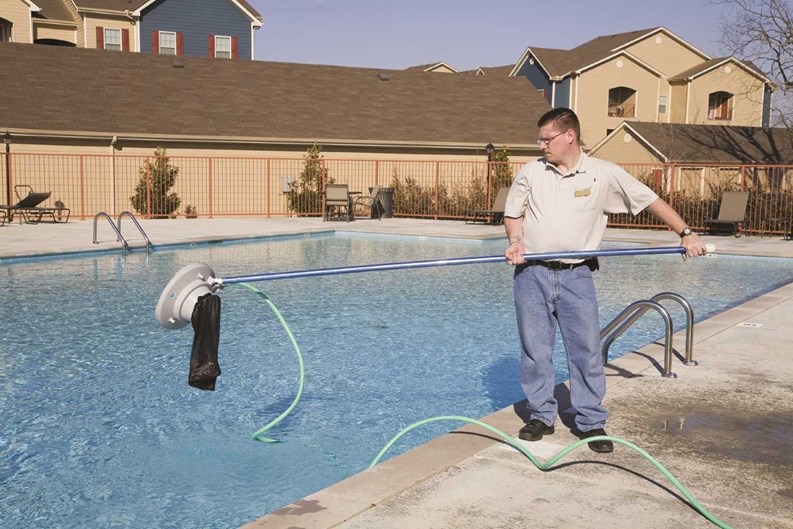Whether a building is a luxury high rise with an in-house movie theater, rooftop pool, and climate-controlled wine cellar or a much more modest low-rise or townhome community with a simple community room or gazebo, managing common amenities is just another function of condo/HOA administration.
Maintenance schedules, access control, hours of operation, and rules for use are all things that need to be taken into consideration and applied to amenities, regardless of the size of a community or its relative means. There are, however, general strategies for managing some of the more common amenities one finds in the Garden State’s co-ops and condos.
Size and Location
According to Todd Dumaresq, marketing manager for Toll Brothers City Living, a luxury condominium development firm that oversees residential communities, including Hudson Tea, Maxwell Place on The Hudson and 1450 Washington in Hoboken, people love outdoor spaces—but it can be a challenge to manage them in certain areas in New Jersey.
“When you are dealing with a limited amount of space figuring out ways to create that outdoor space to please everyone can be challenging, but we certainly try and I think we’re pretty successful,” says Dumaresq. “A lot of our buildings have rooftop terraces with open air fireplaces or barbeque areas. In Hoboken in Maxwell Place, we have multiple outdoor spaces that include six different grilling stations, an outdoor TV, semi-private lounge areas that actually get used in the winter time.”
“We primarily manage smaller buildings,” notes Larry Silverman, president of Atlantic Property Management in Union City. “Generally speaking, swimming pools are very popular. Screening rooms are also very popular. Residents also like large rooms for parties. A large community room for gathering and card playing. The smaller buildings like things like additional storage that’s in the building. If you can’t have a concierge service for 24 hours, you can have one there during the rush hours like in the morning from 6:30 a.m. to 9:00 a.m. and in the evenings from five to seven to greet people and give packages.”
“Fitness rooms, indoor pools and multipurpose rooms are very popular amenities right now,” adds Edward Corless, vice president of the National Lifestyle Division of Eatontown, New Jersey-based FirstService Residential, a management firm with several New Jersey and New York City properties in its portfolio. “Multipurpose rooms are open rooms that you can use for multiple functions. You could use it for a party, or a cocktail hour or a book club or a yoga or Pilates space.”
Profitable Amenities
Another amenity common in suburban buildings is a coin or smart-card-operated laundry room. Experts say it’s both a convenience and a revenue source for the association, which splits proceeds with the vendor who provides the machines and washing supplies.
Party rooms and rooftop decks have similar revenue potential, if their rental generates income for the association. Where such facilities aren’t rented, users still may be required to put down a security deposit, which won’t be refunded if the condo’s maintenance staff must clean up afterward.
“A party room can go either way if you start renting it out, but you must remember you are liable,” says Silverman. “More basic things that can generate income are basic storage units where you can get a monthly fee for each storage unit. You can find an area of the building that is unused for storage. And then you have additional parking. For instance, you might have a few more spaces than what you need. Or you can do what the airlines do, if you have a parking garage and you have a certain spot that’s closer to the door—those spots can be rented out.”
Corless agrees with Silverman on the revenue generating potential of a parking garage. “If you have a parking garage what I would do is make sure my residents have first dibs on the open spaces,” he says, “And then if we have extras spaces you can open it up to non-residents. But usually, amenities are adequately sized for the building.”
Maintenance Issues
Maintenance dollars allocated specifically to revenue-generating amenities also can provide a tax offset. For example, a natural-wood rooftop deck needs seal-coating and power-washing every year or two to prevent warping due to weathering and temperature changes.
Various challenges and issues may occasionally arise in the management, maintenance and administration of amenities.
“For outdoor spaces you have to pick the right furniture,” says Dumaresq, “It has to be durable and pretty unaffected by the different weather conditions, but we have staff in all of your buildings that help with the management and maintenance of those spaces and upkeep them as part of the condo association.”
“Some things are subcontracted out so you’ll have to keep an eye on the subcontractor,” says Silverman. “But the main thing is if it’s a luxury building you have to keep it neat and clean and give people the feeling that they are walking into a nice building. If it’s an exercise room you want to keep it neat and clean and looking bright and cheerful. They don’t want to go to a basement with no windows. It should be painted nicely with lots of windows and that gives a good feeling to people.”
“Many property managers who run condominiums have never run an indoor pool, or have not had to manage a fitness facility,” adds Corless. “There are different codes and standards that go with that, and there are health and building codes. Also, you have the challenge of organizing people to use the amenities and creating the social networks that will allow community functions to occur. If you move into one of my buildings, there will be someone there asking you what types of things you like to do, whether it’s bike riding, running or going to the theater—and we will try to partner you up with like-minded people in the community.”
Where Responsibility Lies
According to experts, amenities management follows a convoluted chain of command. In the beginning, developers build projects and write the initial rules and regulations to administer the amenities. The owners and boards inherit whatever the developer built. After a community transitions to association control, its board adopts or revises the rules and regulations, and decides whether to add other amenities.
The board in turn delegates responsibility to the property manager and his or her staff to administer the amenities (and the reservations if required for their use), to keep them clean and safe, and to ensure that they are being used according to the rules and regulations.
In Arrears?
Rules and regulations regarding access to and use of various amenities vary from community to community, especially the barring of a resident from using an amenity if they’re in arrears.
“It is certainly possible to restrict owners who are in arrears on their assessments from using amenities,” says Silverman. “For instance, we have common area parking and there are fewer spots than owners and there was one owner that was in arrears and we told her she could not park there. She didn’t and eventually caught up. The management company recommended it to the board, and the board said it was a great idea and we sent the letter out. At first, they didn’t comply and then we sent another letter that said if they didn’t comply we’d tow them because you’ve had sufficient notice. Ultimately, they paid their assessments.”
“Laws vary from state to state in what you can do to collect but you can revoke privileges,” says Corless. “That could include the right to vote on community issues and the use of amenities. The management company usually would write a letter to the unit owner on the board’s behalf. It will say something along the lines of ‘you’re delinquent on your homeowner assessments and if its not paid within 30 days we will revoke your privileges.’ A parking garage may be slightly different. Some parking garages are linked up to your unit, so they are legally inseparable in that way. Other parking garages are set up where the resident doesn’t have a deeded parking space.”
Trends in Amenities
In today’s problematic economy, the main focus in condos is controlling costs. “There’s a swing against exercise rooms because there are so many gyms across New Jersey,” says Silverman. “The gyms are so inexpensive and the smaller buildings can’t compete with that. There used to be WiFi centers but not so much now.”
According to Corless, “Amenities are becoming more flexible. Most management companies are looking more at ways of improving people’s lives. We are asking questions like ‘What are the things we can do to help your life? For example, would it be helpful if we picked up your dry cleaning and put it in a room in the building for you so you don’t have to worry about the store closing, and it will be there for you when you get home. We are trying to look at the way you live and try to make your life less hectic. That can be done through amenities and by services.”
George Leposky is a freelance writer and a frequent contributor to The New Jersey Cooperator. Staff writer Christy Smith-Sloman contributed to this article.







Leave a Comment